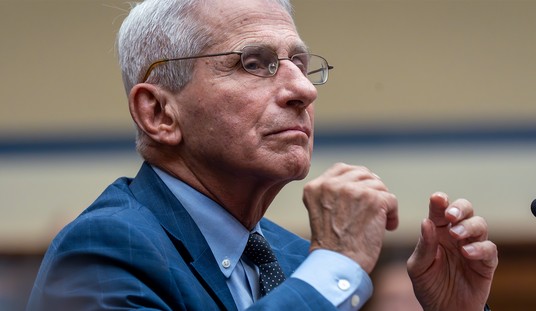The laws of supply and demand are beautiful things – expressions of logic as elementary as the basic laws of physics, which govern everything except the more unruly subatomic particles, which thumb their noses at laws, dress like slobs, and listen to the kind of music that drives their parent atoms crazy.
Supply and demand even applies to the use of government power, although the highest imperative of socialism is to pretend otherwise. There is always enormous demand for government. Lots of people want State power to be deployed for their benefit, or to punish their competitors. (That’s why Big Business is not at all antithetical to Big Government.) There is a bottomless appetite for “free” goodies. Lots of people will always believe that any given social problem can be solved through the application of coercive force, which they prefer to think of as “political leadership” – smart people rolling up their sleeves and bringing order out of chaos.
Nobody likes chaos, which is why desperate Big Government hacks, like Senate Majority Leader Harry Reid, have taken to insulting those who want smaller government by calling them “anarchists.” A $3.6 trillion government that only spends $3.5 trillion next year would be “anarchy” under this definition. The natural desire for orderly life is carefully and deliberately perverted into demand for government control by the people who profit from supplying such control.
In the free market, heavy demand for a product eventually finds an equilibrium with supply and cost. Suppose a car dealership began selling brand-new, top-of-the-line sports cars for $5000 apiece. The demand for these cars would be immense – you’d have people lining up around the block to buy them. (Which would actually increase their effective cost, because consumers correctly view the convenience of purchasing an item as part of the cost of buying it.) But long before you had any great number of people grumbling that it’s too much of a hassle to spend all day standing in line to buy those $5000 sports cars, the auto dealership would go out of business, because it would be losing a ton of money on every sale.
That’s not how government power works. It is a commodity – under Obama-style command economics, it’s the single most valuable commodity in the land. A dash of government favor can be worth more than everything in the inventory of a business operation; it can be worth more to a welfare dependent than the income from a full-time job.
But the cost of this particular commodity is hidden with great care. It is common practice to pretend that government power has no cost whatsoever – it’s funded by deficit spending, or it will produce benefits that exceed the burden of funding it. This is never true, ever. There are no zero-cost exercises of compulsive force, just as there are no zero-cost private-sector business models. But generations of people grow up believing foolish promises that benefits and regulations can be provided or imposed for “free.”
Of course, the best way to make something appear “free” to a valued constituent is to force others to pay for it. This is never described as “greed” or “theft,” although those terms would certainly be applied to anything else a consumer forced other people to buy for him. The cost of government is so unevenly distributed that describing it as “something we all do together,” the way liberals love to do, is a sick joke. If government was something we all did together, everyone would be paying for it.
The costs everyone does pay are hidden, often collected from end-user America by passing them through business ventures, which essentially become involuntary tax collectors by recouping the cost of taxes and regulations. If a new regulation imposed heavy costs on shoe makers, they would recover their losses by increasing the price of shoes. Shoe consumers would not see this as a “tax,” but it most certainly is. Politicians would be standing by to direct any resentment they might feel at the shoemakers, not the politicians who actually raised the cost of shoes.
Another good tactic for hiding cost is to defer it by borrowing money to finance spending programs. Today’s voters reap the benefits; their children will pay the bills. This strategy also prevents the cost of a new government program from inconveniencing the beneficiaries of existing programs. The ruling class doesn’t have to make any painful choices or trade-offs. The young people who eventually pay deferred costs are told there is nothing they can to escape them – they must accept the indebted world they were born into as a fact of life, because they weren’t around to cast a vote when the government credit cards were run up. People often delude themselves about the true cost of personal goods they purchase with credit cards. The delusions grow even thicker when it comes to “purchasing” government on a bottomless line of credit.
The cost of coercion is often measured through lost opportunities. When we are forced to do something, we lose the value of whatever we might otherwise have chosen to do. Every child forced to sacrifice playtime to do his chores understands this, but adults are swiftly persuaded to forget it. It’s not difficult for the ruling class to persuade voters that the opportunity cost of compulsion is absolutely zero, which is patently absurd. Everything that people would freely choose to do, absent government regulation, has measurable value. Sometimes it’s worth sacrificing this value, and sometimes it isn’t. But it’s foolish to pretend value is not lost, every time a command is imposed from above.
Normally, the laws of supply and demand lead to rational, sustainable allocation of a limited resource. There is little point in encouraging greater demand when supply is restricted and price cannot be raised. In other words, the lot selling $5000 sports cars is throwing good money after bad by running an expensive TV advertising campaign for its unsustainable business practice. The manufacturers who provide those cars aren’t going to be impressed by long lines of people clamoring to buy them for a fraction of their true cost.
But government is uniquely driven by demand. Politicians derive great power by cultivating demand for a product whose true price is obscure, supplied through a “business model” that would long ago have put CEOs behind bars for fraud. The demand for a government service is treated as the only relevant factor. If a small number of people hotly demands more government, the majority is expected to shut up and pay for it.
The anticipated (and, of course, usually over-sold) benefits of a program are the only allowable measure of its worth. In recent times, this has even trumped Constitutional authority and the right of dissent. Who cares whether some people get trampled underfoot? Who cares if they’re forced to betray their moral conscience, surrender a piece of the Bill of Rights, as long as the latest brilliant scheme would be “effective,” as judged by its eager advocates? Don’t talk about the opportunity cost of better alternatives lost to history. Don’t honestly compute the cost of some desirable national outcome, evenly divide it among the populace, and ask them if it’s something they really want to pay for.
And don’t ask about exit strategies in case the new plan is a failure. People generally view the difficult of terminating a contractual agreement as part of its cost. That’s why certain phone plans advertise that no long-term contract is required, or subscription plans boast they can be canceled without penalty at any time. Would you be willing to sign up for a great low-cost program if told in advance that you cannot cancel it for at least 10 years? Maybe, maybe not… but you’d certainly think about that enduring obligation when considering your options. You’d probably be curious to know why the vendor is so eager to lock you in for ten years in advance.
But with Big Government’s invariably disappointing “products,” we’re not supposed to think about how difficult it will be to change course in the future. The people pushing a program don’t tell you it’s eternal, no matter how badly it fails. Later, they’ll thunder about the “settled law of the land” and refuse to compromise, but when your vote still makes a difference, they never tell you it’s the last vote you, or your children, will ever be allowed to cast. You might get unhealthy ideas about the true cost of government if they admitted something like that up front.
No matter how ill-conceived a government program might be, someone always benefits from it, somewhere. That’s usually true of business products as well – even the most infamous disaster still has its fans. It’s madness to judge the value of a product solely by its happy customers – sorry, Betamax and HD-DVD fans! But that’s the way we are expected to look at government programs. Demand is all that matters. The kids can worry about all that supply and cost stuff when they grow up. With a little luck, and a lot of propaganda, the opportunity cost of the world they might have known can be concealed from them forever.













Join the conversation as a VIP Member